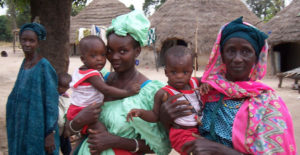 There’s a Senegalese proverb: “The grandmother’s heart is the school where one prepares for life.”
There’s a Senegalese proverb: “The grandmother’s heart is the school where one prepares for life.”
But what if westernization has made that heart less available to young people, especially girls?
The standard practice for health and development workers looking to change unproductive traditional behaviors, like female genital mutilation, teenage pregnancy, and forced marriage, is to focus on the younger generation, which distances them from their tribal culture.
But in Senegal, The Grandmother Project has taken the opposite tack. It might seem counter-intuitive to enlist village grandmothers, the people responsible for FMB/C (female genital mutilation and cutting) but this approach has been very successful in a series of programs.
They begin by helping all members of the community to talk together about what has gone right, and then to decide what practices they want to end. When grandmothers understand the long term effects of some traditional practices, it is they who become the agents of real change. They use their storytelling, dancing, and singing to teach their lessons and reclaim their legacy — strong, nurturing communities.
One local teacher put it this way: “Culture for a people is like water for a plant.”